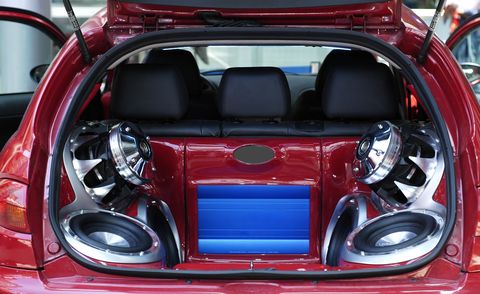Florida Has Made Blasting Music in the Car a Ticketable Offense

Pola Damonte via Getty ImagesGetty Images
A new law in Florida went into effect on July 1 that lets police hand out tickets to people blasting music from their cars if the music is audible from at least 25 feet away.Some residents quoted by local media are in favor of the new restrictions, while others worry about infringements on their personal freedoms or the law being used as an excuse to pull drivers over for other reasons.A similar law was declared unconstitutional by the Florida Supreme Court in 2012.
For many people, driving and listening to music go hand in hand. But if you live in Florida or plan on driving in the Sunshine State, a new law means that you will need to be careful about how you enjoy your favorite songs while cruising. The state law, which went into effect on July 1, gives police officers the power to issue tickets to drivers whose music is audible from 25 feet away from their vehicle. For context, a 2022 Chevy Spark measures nearly 12 feet long while a 2022 Chevy Suburban stretches nearly 19 feet long. This means that if your tunes are loud enough to be heard one to two car lengths—depending on the size of your car—away, you could be in for a ticket.
The tickets will see offenders handed a $114 to $116 fine, but they will not receive points on their licenses. Cops will also have the discretion to issue tickets for music heard from closer distances if the vehicle is near a church, school, or hospital. It seems that police officers will not use a sensor to measure sound levels, with the decision instead made at the police’s discretion.
While 25 feet might not seem like very far, especially if your windows are down, police insist that they are only trying to curb the most flagrant examples of motorists that are disturbing the peace. “We look for the more egregious violations, that you can pretty much hear coming from a block away,” Fort Lauderdale Police Captain Tim McCarthy said to NBC Miami. “We are not trying to target someone trying to listen to music and have a good time,” Lt. Mike Crabb of the Orange County Sheriff’s Office told WESH. Crabb also explained that the law was geared towards safety, suggesting that drivers listening to loud music might not be able to hear the sirens of a police car, fire truck, or ambulance.
Some Floridians approve of the law, with NBC Miami, WESH, and WTSP quoting residents who have been awakened late at night by cars blasting music in their towns. But others have questioned whether the law infringes on personal freedoms, and Richard Catalano, a St. Petersburg lawyer, told the Tallahassee Democrat that he believes the law will be used as “a pretext to pull people over for other reasons.”
Florida Tried and Failed Once Before
This isn’t the first time Florida has implemented such a law. In 2012, the Florida Supreme Court determined that a previous law against playing loud music from cars was unconstitutional, saying that it violating free speech rights. Catalano had actually been the catalyst for overturning the original law, after he challenged a $73 ticket he was given for listening to Justin Timberlake as he drove to work.

MaicaGetty Images
Some officers are insisting that the new legislation is “simply giving law enforcement another tool on their belt in order to allow peace in communities,” but other officers haven’t been so subtle about the fact that this law will likely be used as a way to argue probable cause for initiating a traffic stop. “It just gives another opportunity for an officer to attempt to or see if they can identify any other identifiers that would allow them to continue on with any criminal investigation,” Bartow Police Capt. William Stevens told WFLA.
This raises questions about who the law will be primarily used against. The original law that was ruled unconstitutional stated that “the detection of a rhythmic bass reverberating type sound is sufficient to constitute a plainly audible sound.” The new law says that the Department of Highway Safety and Motor Vehicles “shall adopt rules defining ‘plainly audible’ and establish standards regarding how sound should be measured by law enforcement personnel.” It is not clear, however, if those rules have been set, giving police officers a lot of leeway in defining what plainly audible means. The original definition’s focus on bass certainly seems to be targeting specific genres of music. Will the police issue a ticket for someone blasting Beethoven? Given that the prior law was contested and declared unconstitutional, it seems likely that the new law will face legal challenges in the coming years. But for the moment, it’s probably best to keep the volume in check.
This content is imported from {embed-name}. You may be able to find the same content in another format, or you may be able to find more information, at their web site.
This content is created and maintained by a third party, and imported onto this page to help users provide their email addresses. You may be able to find more information about this and similar content at piano.io



